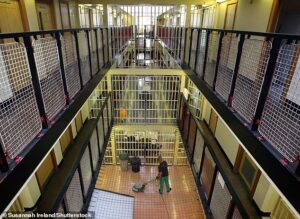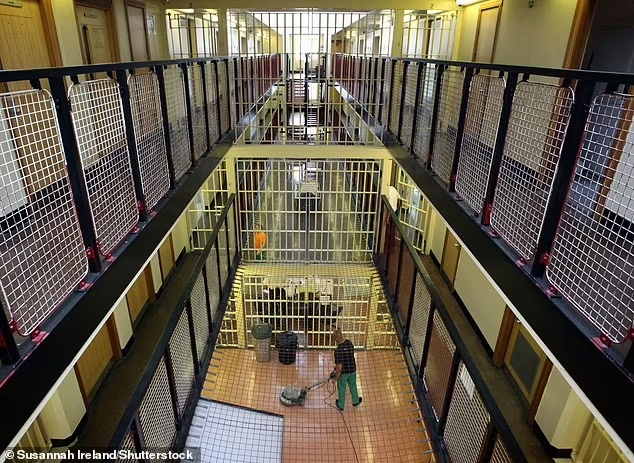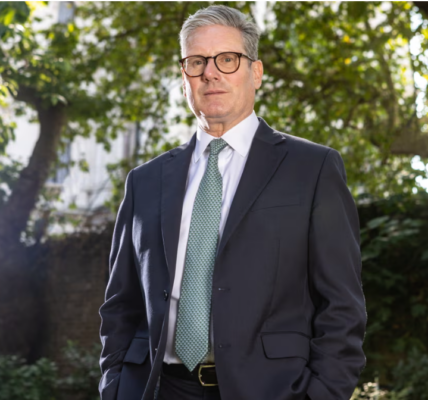A Desperate Move: Overcrowded British Prisons Force Inmates to Be Housed in Estonia as Numbers Reach Record High.H
British prisoners could soon be housed in Estonian jails after the number of criminals imprisoned in England and Wales hit a record high of 88,350.

Estonia’s minister of justice Liisa Pakosta yesterday said they have cells available to rent out to its Nato allies.
It comes as some judges have been warned not to send people to jail over low-level crimes and some prisoners have are set to be released early to ease the overcrowding issue in Britain’s prisons.
Ms Pakosta said the scheme could be worth £25 million to Estonia and suggested that Britain and Sweden are already in talk to ship prisoners to the Baltic nation.
She said: ‘Half of the spaces are empty. And it is true that I’ve submitted a memo to the government cabinet for discussion, to choose the direction of the solution with which to proceed.’
Estonia’s minister of justice Liisa Pakosta yesterday said they have cells available to rent out to its Nato allies
It comes as some judges have been warned not to send people to jail over low-level crimes and some prisoners have are set to be released early to ease the overcrowding issue in Britain’s prisons
The total number of prisoners in England and Wales as of August 30 is 88,350 which is the highest it has been since 2011.
Read More
Child rapist spared jail due to overcrowding crisis as judge says custody was ‘virtually inevitable’
It is an increase of 116 from the week before when it was 88,234 and nearly 1,000 more than four weeks ago when there were 87,362 imprisoned.
It comes after the recent far-right across the UK riots saw hundreds of arrests, on-going convictions and sentencing of violent protesters.
It forced ministers to activate ‘Operation Early Dawn’ last week, triggering emergency measures to avoid prison overcrowding as more rioters are sentenced.
The long-standing plan, described as a ‘one in, one out’ policy, has been implemented in the North of England in the wake of the recent widespread d isorder across towns and cities.
It allows defendants to be held in police cells and not summoned to magistrates’ court until a space in prison is available.
Since taking office, Labour has cut the proportion of a sentence inmates must serve behind bars from 50 per cent to 40 per cent.
Far-right protesters gather outside Holiday Inn Express in Manvers, which is being used as an asylum hotel, on August 4, 2024
Since taking office, Keir Starmer’s Labour government has cut the proportion of a sentence inmates must serve behind bars from 50 per cent to 40 per cent
The temporary move – due to start on 10 September – is expected to result in 5,500 offenders being released in September and October.
It does not apply to those convicted of sex offences, terrorism, domestic abuse or some violent offences.
And those released early will serve the rest of their sentence under ‘strict’ licensing conditions in the community.
However, a convicted child rapist escaped a jail sentence last week because of the overcrowding crisis in Britain’s prisons – with a judge admitting that time behind bars would have been ‘virtually inevitable’ otherwise.
British prisoners could soon be housed in Estonian jails after the number of criminals imprisoned in England and Wales hit a record high of 88,350.
Estonia’s minister of justice Liisa Pakosta yesterday said they have cells available to rent out to its Nato allies.
It comes as some judges have been warned not to send people to jail over low-level crimes and some prisoners have are set to be released early to ease the overcrowding issue in Britain’s prisons.
Ms Pakosta said the scheme could be worth £25 million to Estonia and suggested that Britain and Sweden are already in talk to ship prisoners to the Baltic nation.
She said: ‘Half of the spaces are empty. And it is true that I’ve submitted a memo to the government cabinet for discussion, to choose the direction of the solution with which to proceed.’
Estonia’s minister of justice Liisa Pakosta yesterday said they have cells available to rent out to its Nato allies
It comes as some judges have been warned not to send people to jail over low-level crimes and some prisoners have are set to be released early to ease the overcrowding issue in Britain’s prisons
The total number of prisoners in England and Wales as of August 30 is 88,350 which is the highest it has been since 2011.
Read More
Child rapist spared jail due to overcrowding crisis as judge says custody was ‘virtually inevitable’
It is an increase of 116 from the week before when it was 88,234 and nearly 1,000 more than four weeks ago when there were 87,362 imprisoned.
It comes after the recent far-right across the UK riots saw hundreds of arrests, on-going convictions and sentencing of violent protesters.
It forced ministers to activate ‘Operation Early Dawn’ last week, triggering emergency measures to avoid prison overcrowding as more rioters are sentenced.
The long-standing plan, described as a ‘one in, one out’ policy, has been implemented in the North of England in the wake of the recent widespread disorder across towns and cities.
It allows defendants to be held in police cells and not summoned to magistrates’ court until a space in prison is available.
Since taking office, Labour has cut the proportion of a sentence inmates must serve behind bars from 50 per cent to 40 per cent.
Far-right protesters gather outside Holiday Inn Express in Manvers, which is being used as an asylum hotel, on August 4, 2024
Since taking office, Keir Starmer’s Labour government has cut the proportion of a sentence inmates must serve behind bars from 50 per cent to 40 per cent
The temporary move – due to start on 10 September – is expected to result in 5,500 offenders being released in September and October.
It does not apply to those convicted of sex offences, terrorism, domestic abuse or some violent offences.
And those released early will serve the rest of their sentence under ‘strict’ licensing conditions in the community.
However, a convicted child rapist escaped a jail sentence last week because of the overcrowding crisis in Britain’s prisons – with a judge admitting that time behind bars would have been ‘virtually inevitable’ otherwise.



